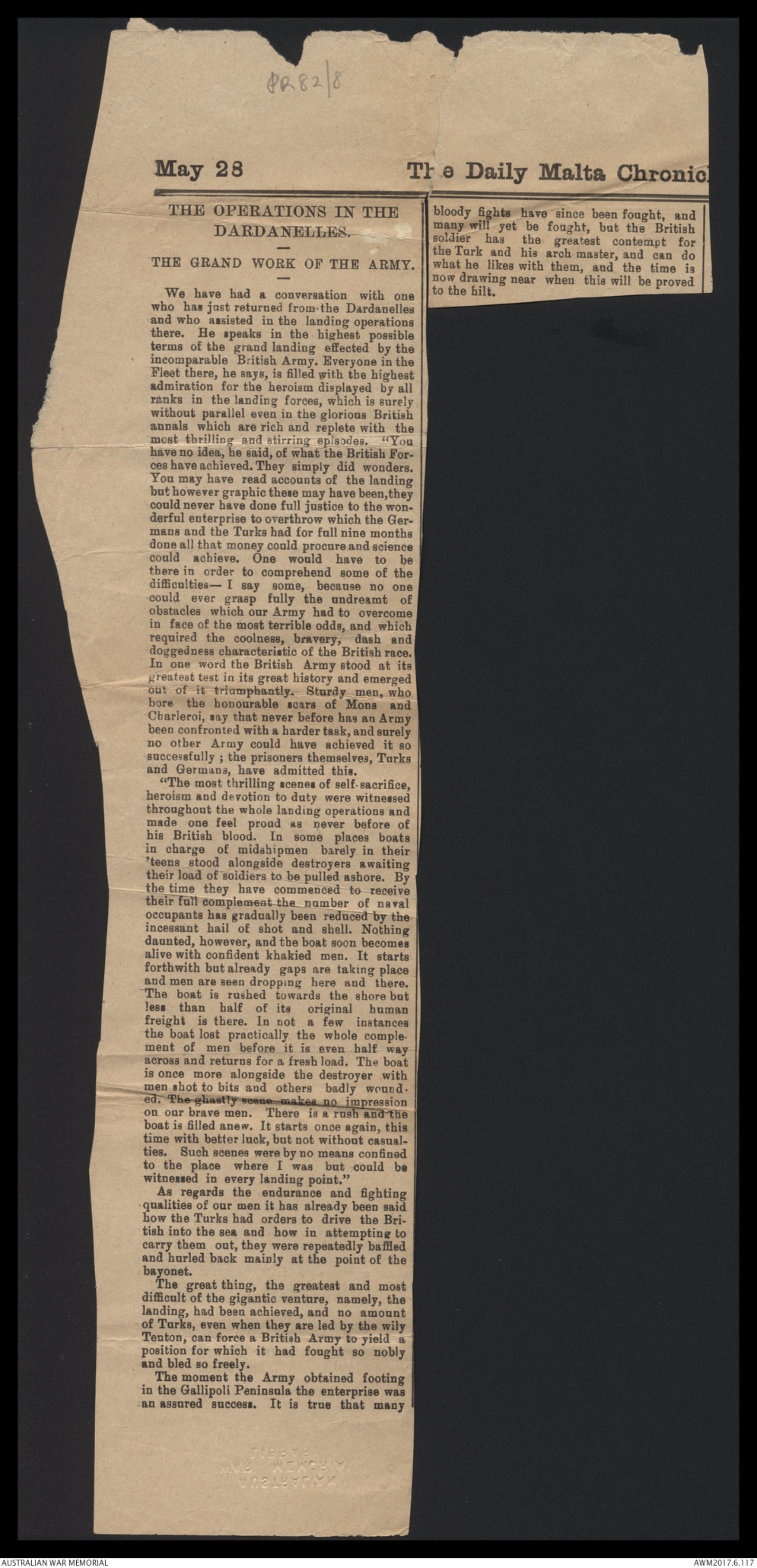Newspaper clipping from the Malta Daily Chronicle

PR82/8
May 28 The Daily Malta Chronic.
THE OPERATIONS IN THE
DARDANELLES
THE GRAND WORK OF THE ARMY.
We have had a conversation with one
who has just returned from the Dardanelles
and who assisted in the landing operations
there. He speaks in the highest possible
terms of the grand landing effected by the
incomparable British Army. Everyone in the
Fleet there, he says, is filled with the highest
admiration for the heroism displayed by all
ranks in the landing forces, which is surely
without parallel even in the glorious British
annals which are rich and replete with the
most thrilling and stirring episodes. “You
have no idea, he said, of what the British Forces
have achieved. They simply did wonders.
You may have read accounts of the landing
but however graphic these may have been, they
could never have done full justice to the wonderful
enterprise to overthrow which the Germans
and the Turks had for full nine months
done all that money could procure and science
could achieve. One would have to be
there in order to comprehend some of the
difficulties— I say some, because no one
could ever grasp fully the undreamt of
obstacles which our Army had to overcome
in face of the most terrible odds, and which
required the coolness, bravery, dash and
doggedness characteristic of the British race.
In one word the British Army stood at its
greatest test in its great history and emerged
out of it triumphantly. Sturdy men, who
bore the honourable scars of Mons and
Charleroi, say that never before has an Army
been confronted with a harder task, and surely
no other Army could have achieved it so
successfully ; the prisoners themselves, Turks
and Germans, have admitted this.
“The most thrilling scenes of self-sacrifice,
heroism and devotion to duty were witnessed
throughout the whole landing operations and
made one feel proud as never before of
his British blood. In some places boats
in charge of midshipmen barely in their
’teens stood alongside destroyers awaiting
their load of soldiers to be pulled ashore. By
the time they have commenced to receive
their full complement the number of naval
occupants has gradually been reduced by the
incessant hail of shot and shell. Nothing
daunted, however, and the boat soon becomes
alive with confident khakied men. It starts
forthwith but already gaps are taking place
and men are seen dropping here and there.
The boat is rushed towards the shore but
less than half of its original human
freight is there. In not a few instances
the boat lost practically the whole complement
of men before it is even half way
across and returns for a fresh load. The boat
is once more alongside the destroyer with
men shot to bits and others badly wounded.
The ghastly scene makes no impression
on our brave men. There is a rush and the
boat is filled anew. It starts once again, this
time with better luck, but not without casualties.
Such scenes were by no means confined
to the place where I was but could be
witnessed in every landing point."
As regards the endurance and fighting
qualities of our men it has already been said
how the Turks had orders to drive the British
into the sea and how in attempting to
carry them out, they were repeatedly baffled
and hurled back mainly at the point of the
bayonet.
The great thing, the greatest and most
difficult of the gigantic venture, namely, the
landing, had been achieved, and no amount
of Turks, even when they are led by the wily
Teuton, can force a British Army to yield a
position for which it had fought so nobly
and bled so freely
The moment the Army obtained footing
in the Gallipoli Peninsula the enterprise was
an assured success. It is true that many
bloody fights have since been fought, and
many will yet be fought, but the British
soldier has the greatest contempt for
the Turk and his arch master, and can do
what he likes with them, and the time is
now drawing near when this will be proved
to the hilt.
 Sandy Mudie
Sandy MudieThis transcription item is now locked to you for editing. To release the lock either Save your changes or Cancel.
This lock will be automatically released after 60 minutes of inactivity.